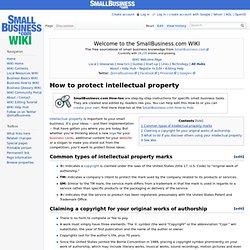

Intellectual Property [READ] Intellectual property (IP) rights are the legally recognized exclusive rights to creations of the mind.[1] Under intellectual property law, owners are granted certain exclusive rights to a variety of intangible assets, such as musical, literary, and artistic works; discoveries and inventions; and words, phrases, symbols, and designs. Common types of intellectual property rights include copyright, trademarks, patents, industrial design rights, trade dress, and in some jurisdictions trade secrets. Although many of the legal principles governing intellectual property rights have evolved over centuries, it was not until the 19th century that the term intellectual property began to be used, and not until the late 20th century that it became commonplace in the majority of the world.[2] The British Statute of Anne (1710) and the Statute of Monopolies (1624) are now seen as the origins of copyright and patent law respectively.[3]
Intellectual property versus Intellectual property rights. How to protect intellectual property - SmallBusiness.com: The free small business wiki sourcebook. Intellectual property is important to your small business.

It's your ideas -- and their implementation -- that have gotten you where you are today. But whether you're thinking about a new logo for your business cards, additional content for your website or a slogan to make you stand out from the competition, you'll want to protect those ideas. [edit] Common types of intellectual property marks ©: Indicates a copyright is claimed under the laws of the United States (title 17, U.S. Code) to "original work of authorship. "